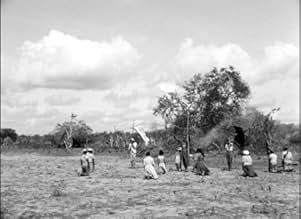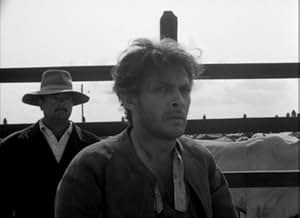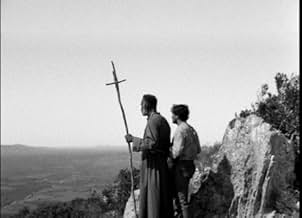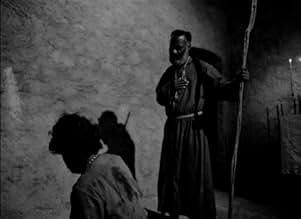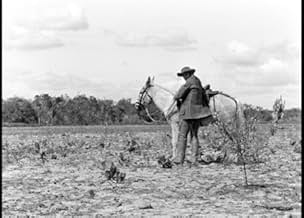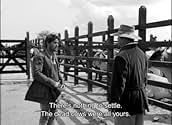ÉVALUATION IMDb
7,2/10
5,7 k
MA NOTE
Ajouter une intrigue dans votre langueAfter killing his employer when he tries to cheat him out of his payment, a man becomes an outlaw and starts following a self-proclaimed saint.After killing his employer when he tries to cheat him out of his payment, a man becomes an outlaw and starts following a self-proclaimed saint.After killing his employer when he tries to cheat him out of his payment, a man becomes an outlaw and starts following a self-proclaimed saint.
- Prix
- 1 nomination au total
Milton Rosa
- Moraes
- (as Milton Roda)
Marrom
- Cego Júlio
- (uncredited)
Histoire
Le saviez-vous
- AnecdotesIn the scene where we see Manuel (Geraldo Del Rey) carrying a huge stone over his head while climbing Monte Santo on his knees, Del Rey insisted on carrying a real stone that weighted over 20 kilos - something that really worried director Glauber Rocha. After the shooting, Del Rey had to take 2 days off, as he wasn't in condition to show up.
- ConnexionsEdited into A Edição do Nordeste (2023)
- Bandes originalesManuel e Rosa
Written by Glauber Rocha & Sérgio Ricardo
Commentaire en vedette
At just 25, Brazilian director Glauber Rocha directed Black God, White Devil, now considered one of the most important pictures to ever come out of Brazil, and a key entry into the Cinema Novo movement. Combining elements of Sergio Leone, Italian neo-realism, and Soviet propaganda such as the work of Sergei Eisenstein, Rocha created a brutal, grainy world inhabited by suicidal religious fanatics, wandering hit men, and psychopathic bandits. From the opening shots of rotting animal corpses and the endless Brazilian sertão, Rocha portrays a grim social realism, one of the key aspects of Cinema Novo.
Ranch-hand Manuel (Geraldo Del Rey) lives in poverty with his wife Rosa (Yona Magalhaes). Fed up with his situation, he goes into town to sell his stock, only to have his boss try to cheat him out of his money, so Manuel kills him with a machete. Fleeing the authorities, he falls in with maniacal preacher Sebastiao (Lidio Silva), who leads Manuel, Rosa and his other followers on a killing spree. Circumstances lead to Manuel leaving the cause, and joining up with famous bandit Corisco (Othon Bastos), who also leads the couple on an orgy of meaningless violence and thievery. But shadowy gun-for-hire Antonio das Mortes (Mauricio do Valle), having been paid by the church and a poltician, is hot on Corisco's tail.
The film very much reminded me of Cormac McCarthy's astounding novel Blood Meridian, where the sheer brutality of the violence played as a metaphor for a society gone sour and a world intent of self-destruction. Like Blood Meridian's The Kid, Manuel and Rosa follow blindly to whichever cause they see a glimmer of hope in. They fail to see the lunacy of Sebastiao's behaviour, and it's only at the point where he stabs a baby in the heart that their eyes seem to be opened, only for them to shack up with the gibbering Corisco, a man who speaks like a poet but doesn't seem to be able to comprehend his own existence. It is at this point, about two-thirds in, that the film seems to lose momentum and becomes somewhat of an unfathomable mess.
But it isn't just the social-political ponderings that make Black God, White Devil so memorable, it also has style in abundance. The camera-work is shaky and urgent at times, full of character close-ups from awkward angles, but it also uses fast editing reminiscent of Eisenstein's greatest works. Similar to Battleship Potemkin's (1925) Odessa steps sequence, the Monte Santo chapel massacre at the hands of Antonio das Mortes is simply electrifying. It is das Mortes' presence that leads to the moments that evoke the work of Sergio Leone, wrapping the shady anti-hero in moody atmosphere like Clint Eastwood's Man With No Name. It's a dangerous mixture of conflicting styles that works beautifully, making the film beautiful and cool, occasionally horrifying, and undoubtedly important. It's just a shame it doesn't manage to keep up with the absolutely astonishing opening two-thirds.
Ranch-hand Manuel (Geraldo Del Rey) lives in poverty with his wife Rosa (Yona Magalhaes). Fed up with his situation, he goes into town to sell his stock, only to have his boss try to cheat him out of his money, so Manuel kills him with a machete. Fleeing the authorities, he falls in with maniacal preacher Sebastiao (Lidio Silva), who leads Manuel, Rosa and his other followers on a killing spree. Circumstances lead to Manuel leaving the cause, and joining up with famous bandit Corisco (Othon Bastos), who also leads the couple on an orgy of meaningless violence and thievery. But shadowy gun-for-hire Antonio das Mortes (Mauricio do Valle), having been paid by the church and a poltician, is hot on Corisco's tail.
The film very much reminded me of Cormac McCarthy's astounding novel Blood Meridian, where the sheer brutality of the violence played as a metaphor for a society gone sour and a world intent of self-destruction. Like Blood Meridian's The Kid, Manuel and Rosa follow blindly to whichever cause they see a glimmer of hope in. They fail to see the lunacy of Sebastiao's behaviour, and it's only at the point where he stabs a baby in the heart that their eyes seem to be opened, only for them to shack up with the gibbering Corisco, a man who speaks like a poet but doesn't seem to be able to comprehend his own existence. It is at this point, about two-thirds in, that the film seems to lose momentum and becomes somewhat of an unfathomable mess.
But it isn't just the social-political ponderings that make Black God, White Devil so memorable, it also has style in abundance. The camera-work is shaky and urgent at times, full of character close-ups from awkward angles, but it also uses fast editing reminiscent of Eisenstein's greatest works. Similar to Battleship Potemkin's (1925) Odessa steps sequence, the Monte Santo chapel massacre at the hands of Antonio das Mortes is simply electrifying. It is das Mortes' presence that leads to the moments that evoke the work of Sergio Leone, wrapping the shady anti-hero in moody atmosphere like Clint Eastwood's Man With No Name. It's a dangerous mixture of conflicting styles that works beautifully, making the film beautiful and cool, occasionally horrifying, and undoubtedly important. It's just a shame it doesn't manage to keep up with the absolutely astonishing opening two-thirds.
- tomgillespie2002
- 9 juill. 2013
- Lien permanent
Meilleurs choix
Connectez-vous pour évaluer et surveiller les recommandations personnalisées
- How long is Black God, White Devil?Propulsé par Alexa
Détails
- Date de sortie
- Pays d’origine
- Site officiel
- Langue
- Aussi connu sous le nom de
- Black God, White Devil
- Lieux de tournage
- sociétés de production
- Consultez plus de crédits d'entreprise sur IMDbPro
Box-office
- Brut – États-Unis et Canada
- 7 826 $ US
- Fin de semaine d'ouverture – États-Unis et Canada
- 3 200 $ US
- 19 nov. 2023
- Brut – à l'échelle mondiale
- 7 826 $ US
- Durée2 heures
- Couleur
- Mixage
- Rapport de forme
- 1.37 : 1
Contribuer à cette page
Suggérer une modification ou ajouter du contenu manquant

Lacune principale
What is the French language plot outline for Deus e o Diabo na Terra do Sol (1964)?
Répondre

